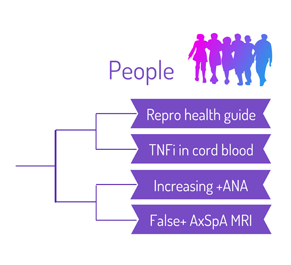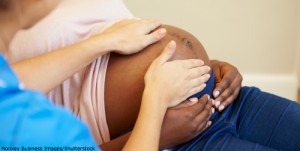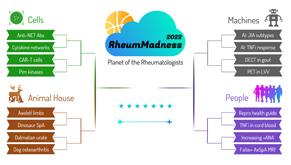 Editor’s note: RheumMadness is the place for everyone crazy about rheumatology to connect, collaborate, compete and learn together. During RheumMadness, rheumatology concepts represent teams that compete against each other in a tournament, much like basketball teams do in the NCAA’s March Madness tournament. In a series for The Rheumatologist, readers will get a chance to read the scouting reports for each concept team. These reports are written by rheumatology fellows from 13 programs throughout the U.S.
Editor’s note: RheumMadness is the place for everyone crazy about rheumatology to connect, collaborate, compete and learn together. During RheumMadness, rheumatology concepts represent teams that compete against each other in a tournament, much like basketball teams do in the NCAA’s March Madness tournament. In a series for The Rheumatologist, readers will get a chance to read the scouting reports for each concept team. These reports are written by rheumatology fellows from 13 programs throughout the U.S.
Don’t forget to submit your RheumMadness 2022 bracket by March 25. The more your picks match those of our Blue Ribbon Panel of rheumatologists, the more points you get. Learn more about the panel and how the brackets work online.
Connect with RheumMadness by subscribing to the podcast and joining the conversation on Twitter, #RheumMadness. Learn more on the RheumMadness website.
Region: People Team: Reproductive Health Guide
Sports pundits love to talk about a team’s ability in terms of offensive and defensive production. This team takes that conversation to another level by focusing on reproduction. With the first ever ACR Guideline for the Management of Reproductive Health in Rheumatic and Musculoskeletal Diseases, this team highlights the crucial role of rheumatologists in discussing reproductive health and family planning with patients.1
 Up to half of premenopausal women with chronic inflammatory diseases report that family planning topics are not adequately addressed during appointments with specialists.2 This conversation should not be left to gynecologists. A patient focus group convened during the ACR guideline process emphasized that rheumatologists are “the doctors who know them and their medications best.”1
Up to half of premenopausal women with chronic inflammatory diseases report that family planning topics are not adequately addressed during appointments with specialists.2 This conversation should not be left to gynecologists. A patient focus group convened during the ACR guideline process emphasized that rheumatologists are “the doctors who know them and their medications best.”1
This guideline plays the full court press to perfection, covering almost any topic a clinician may want to know about regarding the reproductive health of women and men with rheumatic conditions. Key topics include pre-conception counseling, contraception, assisted reproductive technology, fertility preservation with cyclophosphamide, hormone replacement therapy, management of rheumatic disease during pregnancy and the compatibility of medications with pregnancy and breastfeeding.
Each topic is packed with critical interventions that may improve patient outcomes, such as aspirin to prevent preeclampsia in patients with systemic lupus erythematosus and antiphospholipid antibodies.
For clinicians who are not used to engaging in these conversations, the guideline suggests beginning the conversation with the one key question: “Would you like to become pregnant in the next year?”
Additionally, the guideline emphasizes the importance of collaborating with maternal fetal medicine and other specialists to provide optimal care throughout the reproductive cycle because rheumatic diseases and obstetric complications often mimic one another. Multidisciplinary discussions are necessary to plan anticoagulation in antiphospholipid syndrome and fetal echocardiograms in patients with anti-Ro/SS-A antibodies.
According to the authors, these guidelines are intended to be a “resource to share, discuss and disseminate across specialties and patient groups.”1 As such, they are a perfect RheumMadness team and will be a strong contender in the tournament.
Implications
It may be bold to say that no other paper in this tournament will have as much of a clinical impact and use as these guidelines. Before you dismiss this claim, remember rheumatic diseases disproportionately affect women. We are not just autoimmune specialists. We are de facto women’s health providers. This guideline acknowledges this fact and facilitates excellent care for women with rheumatic disease when they are most vulnerable.
This team has the basics down, with clear and concise recommendations on effective contraception and pregnancy-compatible medications. But it also has that special something, taking the combined knowledge of experts in rheumatology reproductive health and putting it at the fingertips of every rheumatologist. No more frantically searching for aspirin recommendations, what to do with that pesky anti-Ro antibodies or even trying to PubMed search whether a medication is safe for men trying to father a child. Heck, if you don’t know how to start the conversation, it has guidance on that too.
You must squint to identify any weaknesses with this team. However, one weak spot is the absence of recommendations on vaccination in pregnancy and management of vasculitis in pregnancy. Regardless of those drawbacks, ask yourself: Is dog osteoarthritis or women’s health more important?
Chances in the Tournament
Reproductive Health Guide will definitely win its first-round matchup against TNFi in Cord Blood and stands a fair chance to win the entire People Region.
Unlike many other teams in the bracket, the reproductive health guide is practical and highly likely to influence all tournament participants, especially considering how much improvement we, as a field, could make in this area. Only half of rheumatologists currently ask their patients about reproductive health!2
We think the chances for Reproductive Health Guide to advance to the final rounds of the tournament hinge primarily on how the Blue Ribbon Panel views the evidence informing the recommendations because many are based on low-quality evidence or expert opinion. Although this fact could be seen as a weakness, it also sets a clear research agenda for moving forward.
Overall, Reproductive Health Guide is a powerhouse that affects the lives of every patient and rheumatologist around the world. Clearly, it could win it all.
Nathaniel Harris, MD, PhD, is a first-year rheumatology fellow at Duke University School of Medicine, Durham, N.C.
Poorva Apte, MD, is a second-year rheumatology fellow at Duke University School of Medicine, Durham, N.C.
Lena Eder, MD, is a first-year rheumatology fellow at Duke University School of Medicine, Durham, N.C.
Lisa Criscione-Schreiber, MD, MEd, is a faculty mentor and a professor of medicine at Duke University School of Medicine, Durham, N.C.
Megan Clowse, MD, is a faculty mentor and an associate professor of medicine at Duke University School of Medicine, Durham, N.C.
David Leverenz, MD, is a faculty mentor and an assistant professor of medicine at Duke University School of Medicine, Durham, N.C.
References
- Sammaritano LR, Bermas BL, Chakravarty EE, et al. 2020 American College of Rheumatology guideline for the management of reproductive health in rheumatic and musculoskeletal diseases. Arthritis Rheumatol. 2020 Apr;72(4):529–556.
- Chakravarty E, Clowse ME, Pushparajah DS, et al. Family planning and pregnancy issues for women with systemic inflammatory diseases: Patient and physician perspectives. BMJ Open. 2014 Feb 5;4(2):e004081.
 Experience All of RheumMadness
Experience All of RheumMadness
During RheumMadness, rheumatology concepts represent teams that compete against each other in a tournament, much like basketball teams do in the NCAA’s March Madness tournament. In a series for The Rheumatologist, readers will get a chance to read the scouting reports. Check out the reports from each region:
Region: Cells
Region: Animal House
Region: Machines
Region: People
• False Positive MRI in Axial SpA
Don’t forget to submit your RheumMadness 2022 bracket by March 25. The winner of each match-up is decided by a seven-member Blue Ribbon Panel of rheumatologists. The panel will vote based on which topic they think is most important to patients, providers and researchers—both now and in the future. The more your picks match those of the panel, the more points you get. The tournament results will be released in four rounds from March 26–April 4. Prizes will be given to participants with the top scores in the following categories: 1) attending/APP, 2) fellow and 3) resident/medical student. The prize is a custom RheumMadness coffee mug and a lifetime of bragging rights.
Connect with RheumMadness by subscribing to the podcast and joining the conversation on Twitter, #RheumMadness. Learn on the RheumMadness website.



